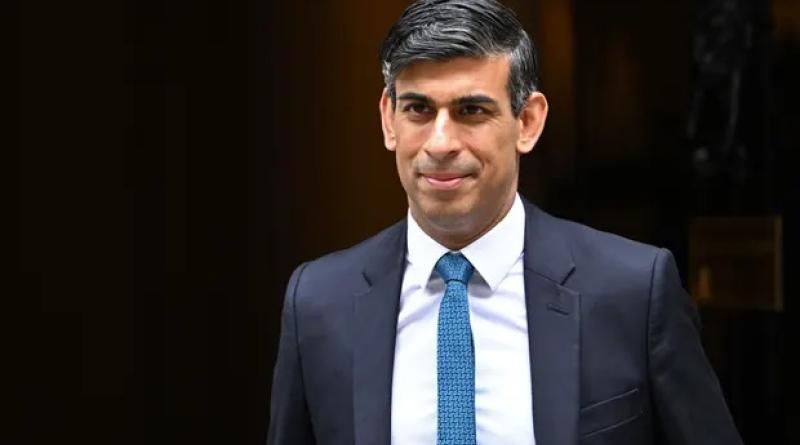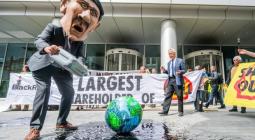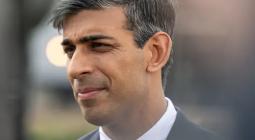Sunak’s new oil and gas licences are ‘moral and economic madness’

By announcing hundreds of new oil and gas licences, the prime minister, Rishi Sunak, has become a “dangerous radical” pursuing “moral and economic madness”.
That is not the judgment of Just Stop Oil, or any other environmental campaign group, but the United Nations secretary general, António Guterres.
“The truly dangerous radicals are the countries that are increasing the production of fossil fuels,” Guterres said in 2022, reacting to a searing report from the Intergovernmental Panel on Climate Change (IPCC).
Sunak, naturally, sees it differently. “It’s vital we bolster our energy security and capitalise on that independence to deliver more affordable, clean energy to British homes and businesses,” he said.
Grant Shapps, the energy security and net zero secretary, said: “New oil and gas licences will drive forward our energy independence and our economy for generations … safeguarding energy bills for British families.”
These claims are simply wrong. The UK is more hooked than most on gas and has the high bills to prove it. Real energy security comes from using less gas. In any case, new UK fields are unlikely to deliver for many years and would be a mere drop in the global oil and gas ocean, having no impact on prices.
The idea of relying on oil, and for “generations”, is frightening. We have a single generation to reach net zero emissions by 2050 and avoid the worst effects of the climate crisis.
Fatih Birol, the executive director of the International Energy Agency, said in 2021: “If [governments] are serious about the climate crisis, there can be no new investments in oil, gas and coal, from now – from this year.”
The world’s scientists agree: new fossil fuels are incompatible with meeting the internationally agreed limit of 1.5C of global heating. Most fossil fuel reserves must stay in the ground, scientists say. Instead, the UK government wants to “max out” the North Sea.
If Sunak were really interested in freeing the UK from the influence of “hostile states” and Vladimir Putin’s “weaponised energy”, which drive the extreme volatility of oil and gas prices, he would be pushing hard on the policies that could free the nation from fossil fuel addiction.
These include the cheapest of all power, onshore wind, which Sunak continues to block. Home energy efficiency, such as insulation, cuts bills, but the Conservative record on this is woeful. In the past year, energy bills were £9.8bn higher than they would have been if the former prime minister David Cameron had not cut the “green crap” and gas imports would be 23% lower. Heat pumps are the best way to cut emissions and costs in most homes, but the UK is last in Europe for installation rates.
Shapps claims that Labour’s energy and climate plans are “an existential threat to our national energy security”. In contrast, analysis by the climate website Carbon Brief shows that Labour’s plans, including ending new oil and gas licences, would result in less imported gas, thanks to a push on renewables.Sunak says gas imported on tankers has higher production emissions than that from the North Sea. That is true but a red herring. Burning, not producing, gas is by far the biggest source of carbon dioxide, and in any case, most gas imported to the UK comes via pipeline from Norway.
Sunak also backed two new carbon capture and storage facilities, where CO2 from gas burning could be captured and buried. CCS will have a small but important role in cutting industrial emissions but, as the IPCC found, renewable energy is by far the bigger and cheaper opportunity.
The UK government claims it is committed to net zero emissions by 2050. It ought to be: the costs of staying hooked on gas could be double that of achieving the target, according to the Office for Budget Responsibility.
But Shapps, the minister responsible, has tweeted 36 times since late May about Labour and Just Stop Oil, and zero times about net zero. The issue appears to have been relegated in Tory eyes to just another front in a culture war, as it stares electoral defeat in the face.
Sunak is fiddling in domestic politics as the world burns in record-breaking heat. The new licences will torch the UK’s hard-won international reputation for climate leadership and embolden petrostates in their efforts to block climate action.
But even if he is “uninterested” in the climate crisis, he could have heeded the advice of Greg Hands, the Conservative party chair. “Gas is expensive and the price of renewables is falling. We need to generate more clean, secure and affordable power in this country, so we’re less exposed to volatile prices set by global markets,” said Hands when he was energy minister in 2022.




